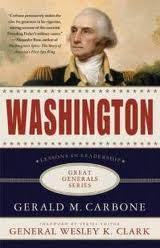Washington: Lessons in Leadership – Book Review
 Washington: Lessons in Leadership. Gerald M. Carbone. 2010. 224 Pages. Paperback. $14.00
Washington: Lessons in Leadership. Gerald M. Carbone. 2010. 224 Pages. Paperback. $14.00
We live in a society that wants results quickly. For many, if it can’t be achieved by a couple of clicks on a keyboard or a pass through a drive-thru, it’s not worth the wait. Consequently, is it any wonder this mentality has spread to our consumption of books? Thus, the popularity of the mini-biography, a genre that has clearly carved a niche for itself over the past several years.
The formula for the mini-biography is pretty straightforward. First, you need to create an audience. To achieve this, use as the book’s subject a figure from history (military or political) that will intrigue a readership. Next, enlist a skilled writer who would be classified as an authority on that figure. Third, ensure the writer can craft a volume that engages the reader focusing on the highlights of the figure’s life. Finally, put this all in a package of roughly 200 pages.
{default}Publisher Palgrave Macmillian clearly understands the above formula and puts it on display in their Great Generals Series, in which they have published over a dozen mini-biographies in the last few years. One of the latest additions to the series is Gerald M. Carbone’s Washington: Lessons in Leadership. It is a book certainly exhibiting all ingredients of the formula.
There exists a potential readership for any book tied to George Washington. The past decade seems to have experienced a resurgence in interest in the history of Colonial America and the American Revolution and those who played a major role in that history. Because of this, interest in Washington has escalated as well (Ingredient One: Market Appeal—YES).
Gerald Carbone may not be regarded as a George Washington subject-matter expert. However, he is highly versed in the history of Colonial America and possesses outstanding literary credentials. In regards to his expertise in the period, Carbone crafted the critically acclaimed volume Nathanael Greene: A Biography of the American Revolution (Palgrave MacMillan, 2008). Additionally, he has been awarded several prestigious writing awards during his 25-year career as a journalist (Ingredient Two: Subject Matter Expertise—Specifically NO/Time Period Yes).
Readers will quickly find that Carbone’s intent within the book is not to offer an abbreviated (extremely abbreviated) synopsis of Washington’s life. His sole emphasis is to discuss the performance of Washington as a senior military leader. In his treatment, he provides readers with a balanced portrayal of Washington. It is a representation that few if any would characterize as one of those "love fests" that can occur in a biography.
Within his discussion, he emphasizes that Washington made leadership mistakes on the battlefield. He also adds that some of those mistakes led to defeats. However, he also illustrates many times in which Washington’s leadership was the key to battlefield success. In total, this approach combined with Carbone’s outstanding writing skills make this a highly readable volume (Ingredient Three: Engaging Volume—YES).
Of course, one of the key components of a mini-biography is that it is "mini." At around 200 pages in length, Carbone has clearly achieved this. It is a credit to his talents that this volume still contains plenty of content. Certainly, his focus on Washington’s military leadership is the key factor in this (Ingredient Four: Concise – YES).
Perhaps the most controversial area relating to the book is the publisher’s decision to include Washington in this series. As addressed earlier, Washington has received his share of criticism for his military leadership. Carbone addresses this in his conclusion. He initially states, "But does Washington belong is a pantheon of books called the Great Generals Series? Arguably he does not."
Further into the conclusion, Carbone provides readers with his thoughts. He opines, "Yes, Washington lost more battles than he won, but he squarely deserves a place in the pantheon of great American generals, for without his military genius, there would have been no other American generals, indeed, no United States of America."
There are many who criticize the virtues of the mini-biography. They believe such books lack sufficient scholarship and consequently, do an injustice to the subject. In some regards, they may be right. However, books like Carbone’s do provide a valuable service. They are clearly a user-friendly package that exposes the subject to an audience that otherwise may not decide to learn about that subject. This certainly can lead to more exploration on the topic by the reader.
In summary, Carbone’s Washington is a classic mini-biography. It is well written and extremely engaging. It will clearly provide a reader a good basic understanding of Washington, the military leader. Just as importantly, it will encourage many readers to seek out other volumes written on Washington – The General.
About the Author:
Rick Baillergeon is a retired U.S. Army Infantry officer. Since his retirement, he has served as a faculty member at the U.S. Army Command and General Staff College. He is also co-author of the popular Armchair General Web series "Tactics 101."

